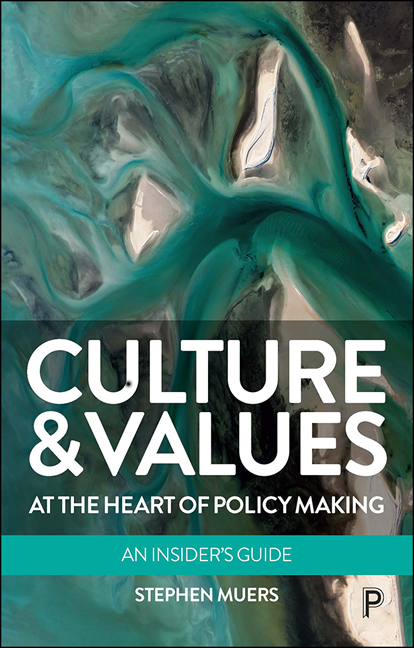Book contents
- Frontmatter
- Dedication
- Contents
- About the Author
- Acknowledgements
- Introduction
- 1 What are Culture and Values?
- Part One Why Culture and Values Matter for Public Policy
- Part Two How Culture and Values Shape the Political System
- Part Three How Policy Makers can Take Culture Seriously
- Conclusion
- Notes
- References
- Index
11 - Being Smart About Evidence
Published online by Cambridge University Press: 18 March 2021
- Frontmatter
- Dedication
- Contents
- About the Author
- Acknowledgements
- Introduction
- 1 What are Culture and Values?
- Part One Why Culture and Values Matter for Public Policy
- Part Two How Culture and Values Shape the Political System
- Part Three How Policy Makers can Take Culture Seriously
- Conclusion
- Notes
- References
- Index
Summary
Discussions about policy often move quickly into discussions about evidence. In the mid-1990s, when I was starting out in my policy career, the concept of ‘evidence-based policy-making’ was very much in vogue. The UK Government published the White Paper Modernising Government (Cabinet Office, 1999). It called for policies ‘shaped by the evidence’ and measured by ‘results rather than activity’ (1999: 15). In a section entitled ‘What Must Change’ the White Paper highlighted ‘better use of evidence and research’ as one of the top priorities (1999: 16). The Performance and Innovation Unit (forerunner of the Prime Minister's Strategy Unit where I later worked) was established in 1998 in part to bring a renewed focus on evidence and analysis to the centre of government. From 2013 onwards the then government developed a network of specialist What Works Centres, responsible for driving evidence and understanding in particular fields. By 2018 there were ten, covering issues from ageing to education to social care (Cabinet Office, 2018). Other countries have developed similar networks (such as the What Works Cities group in the United States).
The chapter addresses the question of how a focus on culture and values sits alongside the value of evidence in policy making. Is it possible to combine rigour around data and evidence with a proper reflection of the importance of softer elements like culture? How does evidence operate in the values-driven political and policy environment set out in Parts One and Two of this book, and what does that mean for how the policy maker needs to think about evidence?
How does evidence work in the policy process?
The starting point for this discussion has to be an understanding of what role evidence plays in the policy process. I remember on the first day of my Public Policy Master's course being shown a diagram of the ‘policy cycle’. This is the model that will be familiar to many students and practitioners of policy: a circle that starts with agenda setting, moving to policy formulation, adoption through the political process, implementation, evaluation and back to agenda setting again. In this model, evidence plays a clear role. The policy maker uses evidence to formulate their policy, gathers new evidence through the evaluation stage and then uses that new material to formulate the next policy iteration.
- Type
- Chapter
- Information
- Culture and Values at the Heart of Policy MakingAn Insider's Guide, pp. 139 - 150Publisher: Bristol University PressPrint publication year: 2020



